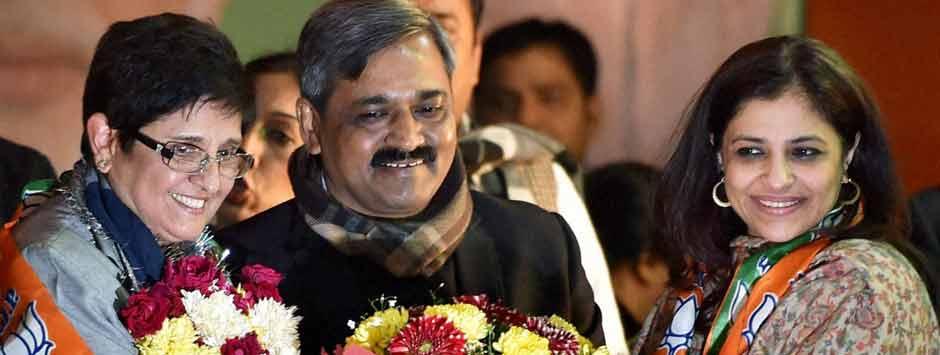Delhi Poll is Now AAP vs AAP
The assembly poll in Delhi is curiously shaping up into a fight between the Aam Aadmi Party and its former members. The real BJP, the frontrunner in the battle for the capital state till the other day, has receded into the sidelines. It’s a deliberate move but the hint of desperation is hard to miss.
The flurry of inductions in the BJP last week, particularly from the AAP, reveals a few unflattering issues with the party. First, by welcoming deadwood and rejected people from other parties with such enthusiasm, it has made clear that it has too much deadwood of its own and it cannot do anything about it.
The likes of Shazia Ilmi and Vinod Kumar Binny don’t carry much heft on their own – the media attention they get is grossly disproportionate to their standing as political figures. If the sole purpose of their induction in the party is to dig up dirt on Kejriwal’s party, it only shows that the BJP has run out of ideas in Delhi.
Also, it reflects the lack of confidence in its own leaders to take the battle to the rival camp.
Second, the party acknowledges, grudgingly of course, that the AAP is much smarter than other parties and the approach towards it has to be different.
An opponent like the Congress could be tackled easily since its strengths and weaknesses are well-defined, but this is not the case with Kejriwal’s party which has not been around long enough to have pronounced weak areas. The AAP quitting after 49 days in power is done to death and is not a talking point among voters any more.
That the BJP is finding it difficult to devise a strategy against the AAP does not come as a surprise.
What makes it more cumbersome is the latter’s grassroots approach to politics. The booth-level approach of BJP president Amit Shah, which has proved to be a success across the country, does not seem to be potent enough against the AAP which has been experimenting with it from the beginning.
Third, there’s a realization that the Modi effect worked best when combined with an anti-incumbency mood. Delhi has been without a government for almost a year now and it is being ruled by the BJP-led Centre by default. That makes the election here a different ball game.
In such a situation organizational strength plays a crucial role. That the BJP can accommodate so many outsiders at the cost of its own local level leaders – the newcomers have to be kept happy with seats or promises of some other kind – reflects what’s wrong with its organization. Internal opposition to the newcomers perhaps explains the delay in the announcement of the party’s candidates.
The BJP was forced to project an outsider, Kiran Bedi, as its chief ministerial face – it’s not official yet, but for all practical purposes she is – less than month before the polls. It’s an admission that the party had no one in its ranks to match Kejriwal’s stature. He had started making it a Modi vs Kejriwal battle and this could have been damaging to the former’s reputation. By giving Bedi a position of pre-eminence it has actually exposed its inadequacies vis-a-vis AAP. It’s an act of desperation.
Now, we have a situation where an outsider will be the face of the party’s campaign and the attack on the AAP and its leadership will be led by its former members. All through this, the real BJP would be on the sidelines, wondering where it went wrong. This is certainly not a happy situation for party president Amit Shah. Expect drastic changes in the party unit after the elections.
News Source: http://www.firstpost.com

